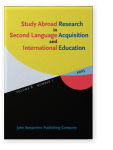Vol. 8:1 (2023) ► pp.50–75
Vol. 8:1 (2023) ► pp.50–75
Returning to a new normal
Social and mental adaptation of study abroad returnees during the first wave of the COVID-19 pandemic
This article presents a comparative case study analysis of two mobility students who, during the first wave of the COVID-19 pandemic, had to terminate their stay abroad early and return home after seven and eleven weeks, respectively. The study aims to shed light on the impact of the outbreak of the pandemic on students’ social contacts and their re-adaptation back home, drawing on interview and questionnaire data. The interview data were analyzed using qualitative content analysis and suggest that, while the outbreak of the COVID-19 pandemic was a stressful experience for both students, which impacted the social contacts they entertained and their re-adaptation at home, the two students’ experiences also differed in many ways. We argue that these differences may be attributable to the social contacts the students maintained prior to the outbreak of the pandemic, the goals associated with the stay abroad, and the students’ coping strategies.
Article outline
- 1.Introduction
- 2.Literature review
- 2.1Social networks during SA
- 2.2Re-entry experiences – Positive and negative perspectives
- 2.3The effects of the beginning of the COVID-19 pandemic on SA
- 2.4Research questions
- 3.Method
- 3.1Case 1: Lea
- 3.2Case 2: Anna
- 3.3Instruments
- 3.3.1Post-stay interview
- 3.3.2While 1 questionnaire
- 4.Results
- 4.1Social contacts and language use during SA (RQ 1)
- 4.2Returning home (RQ 2)
- 4.3Connections between social contacts and return experience (RQ 3)
- 5.Discussion and conclusions
- Acknowledgements
-
References
For any use beyond this license, please contact the publisher at [email protected].
